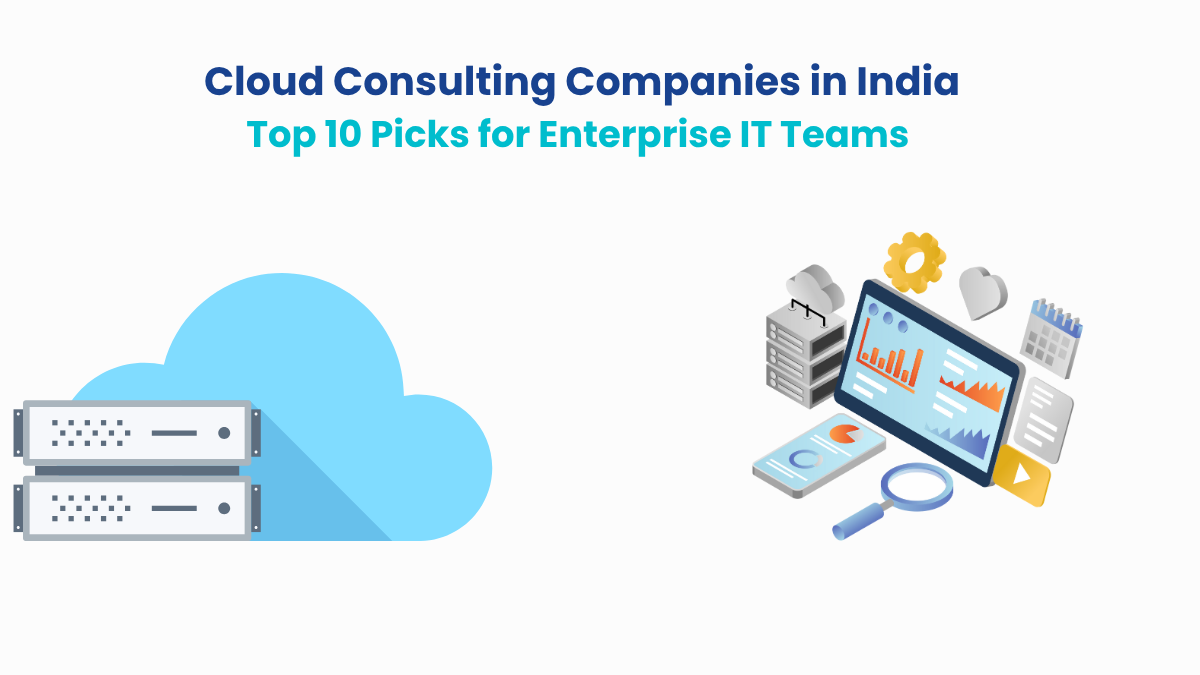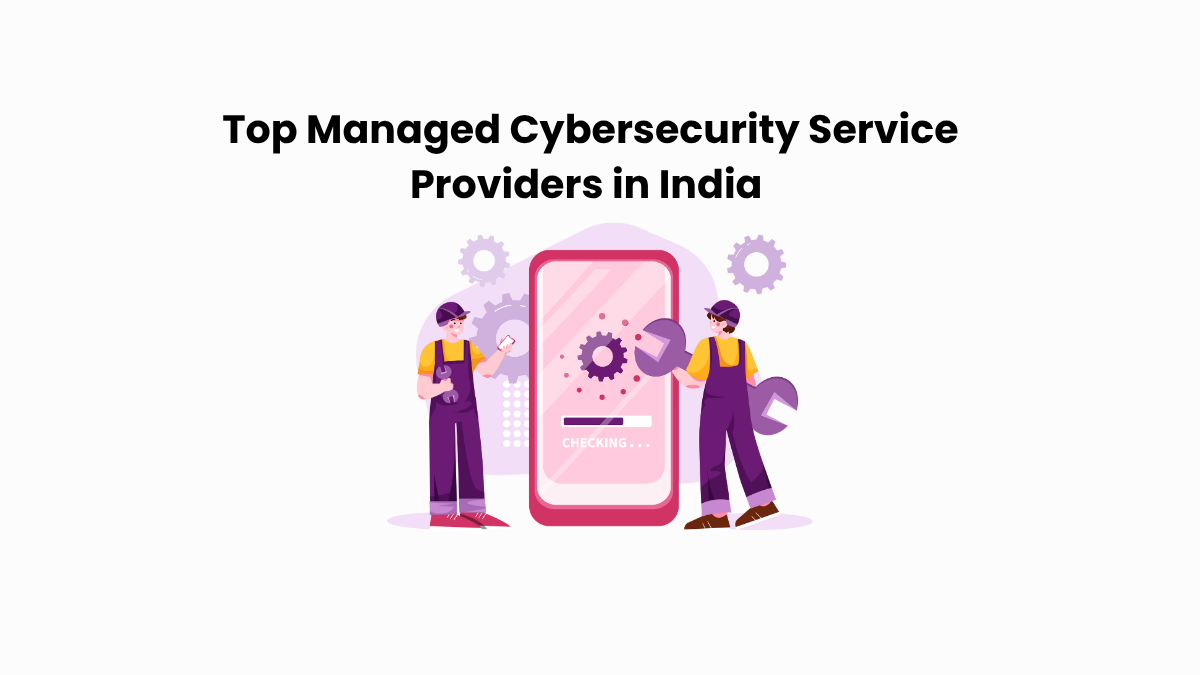India’s digital infrastructure is growing faster than most firewalls can keep up. But so are the attack surfaces. Cloud sprawl, third-party APIs, exposed endpoints, and rushed deployments have widened the risk window for every enterprise.
This shift has led to a surge in demand for VAPT companies in India. From fintech and healthcare to manufacturing and government, security teams are no longer debating whether to test. They are looking for partners who go deeper than basic scans and deliver real, actionable insights.
A standalone vulnerability assessment won’t cut it. A penetration test without remediation guidance is just theater.
That’s why true Vulnerability Assessment and Penetration Testing (VAPT), when delivered strategically and combined, has become mission-critical for Indian enterprises navigating compliance pressure, hybrid infrastructure, and evolving threats.
Not all VAPT providers operate at the same depth. Some run automated scans and call it a day. Others bring real adversary simulation, red teaming expertise, and post-test hardening support.
In this guide, we’ve curated 10 of the most credible VAPT companies in India. Whether you’re securing a fintech stack, a healthcare platform, or a large multi-cloud deployment, these are the names worth considering.
But before we go ahead, let’s look at how to choose the right VAPT service provider.
How to Choose the Right VAPT Company in India: What Actually Matters
Choosing a VAPT company isn’t about ticking boxes. It’s about choosing a security partner who thinks like an attacker, communicates like a strategist, and delivers like an engineer.
Here are the five factors that separate checkbox vendors from enterprise-grade allies:
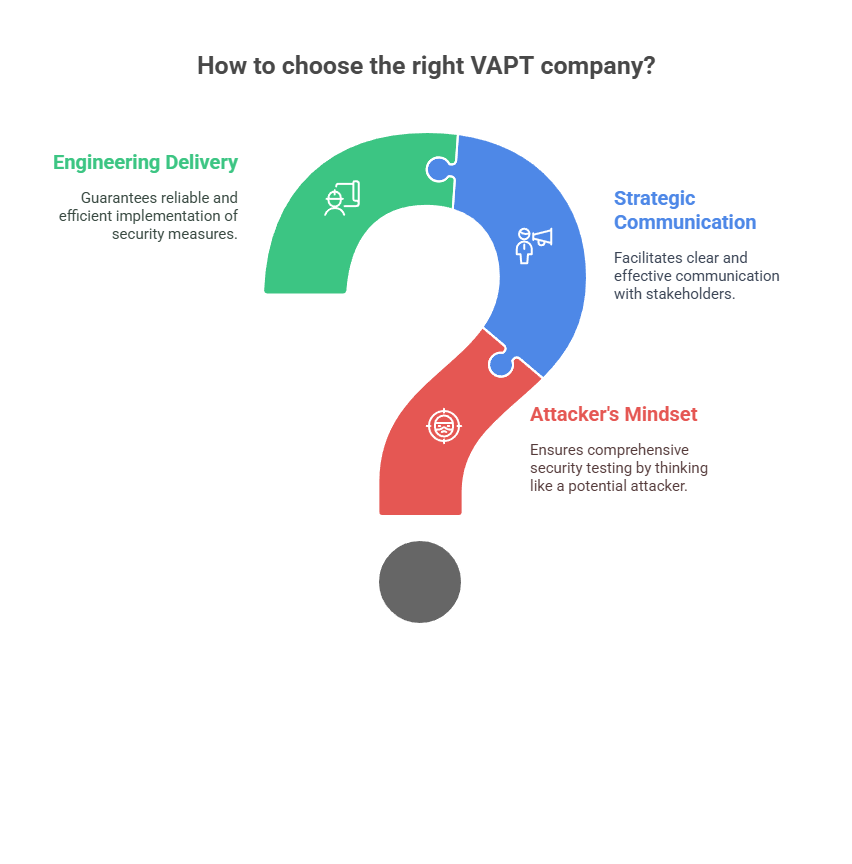
1. Methodology you can see, not just Trust
The best VAPT companies in India don’t hide behind “proprietary processes” or toolkits. They tell you exactly how they simulate attacks, from recon to exploitation.
They explain which vulnerabilities are manually validated. They show how false positives are eliminated, and how they adapt their testing to your actual infrastructure.
This level of transparency matters because you’re not just paying for a scan. You’re paying for insight.
2. Post-Test Support that doesn’t vanish after the PDF
You don’t need a 60-page report. You need to know what to fix on Monday morning. And what can wait.
You should look for companies that stick around after the test.
Consider this: Do they explain exploit chains to your engineering team? Will they help validate patches? Can they map risk to actual business impact?
3. Real-World Experience, not just Certificates
Plenty of firms boast about OSCPs or CEHs. But who’s doing the actual testing?
You want practitioners who’ve broken real systems, worked under pressure, and understand both offensive tactics and defensive architecture.
4. Domain Understanding that goes beyond “Web Apps”
A generic pentest firm may do fine on a WordPress blog. But Indian enterprises deal with complex realities. These include layered cloud infra, IoT devices, legacy applications, zero trust deployments, and now, DPDPA compliance.
Top-tier VAPT companies understand your industry’s pain points. Whether that’s fintech data handling, healthcare interoperability, or telecom infrastructure exposure.
The best companies work across these verticals and bring domain fluency to every test.
5. Reporting that speaks to both Engineers and Executives
A VAPT report isn’t useful unless two things happen:
- Your engineering team knows exactly what to fix and how.
- Your leadership understands what’s at stake, in business terms.
The best VAPT companies bridge both worlds. They avoid jargon, eliminate filler, and focus on exploitability, impact, and next steps.
Their reports are structured for action. They include clear remediation tasks, threat modeling insights, and executive-ready summaries.
Of course, this isn’t an exhaustive checklist. There are other important considerations too, like how well a provider scales across distributed environments.
Whether they offer retesting cycles. How tight their NDA processes are. And how deeply they understand legal frameworks such as India’s DPDPA.
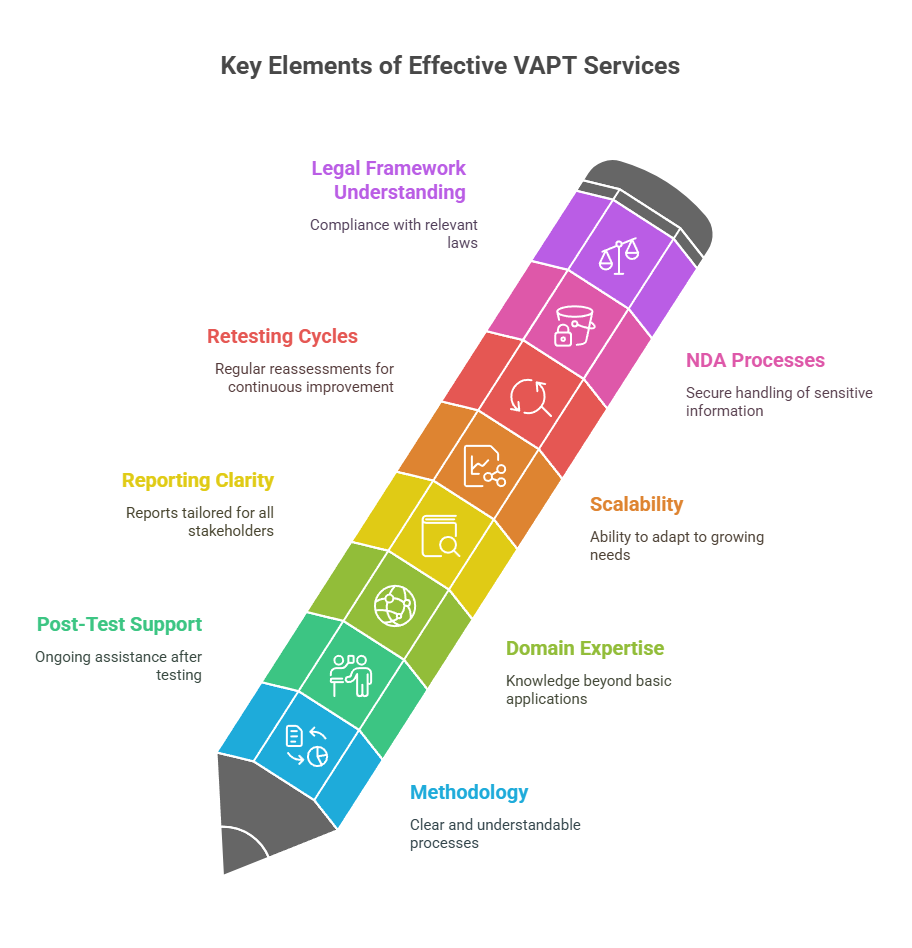
But once you’ve aligned on the fundamentals — methodology, support, expertise, domain fluency, and reporting clarity — these additional factors naturally fall into place with the right partner.
Now let’s look at 10 standout VAPT companies in India that bring this kind of maturity to the table. Starting with Datacipher.
#1. Datacipher
At Datacipher, we approach VAPT as a one-time engagement. Our programs are designed to evolve with your infrastructure, regulatory environment, and threat exposure.
As one of the more established VAPT companies in India, we work closely with enterprises to ensure findings are not only accurate, but also relevant and actionable.
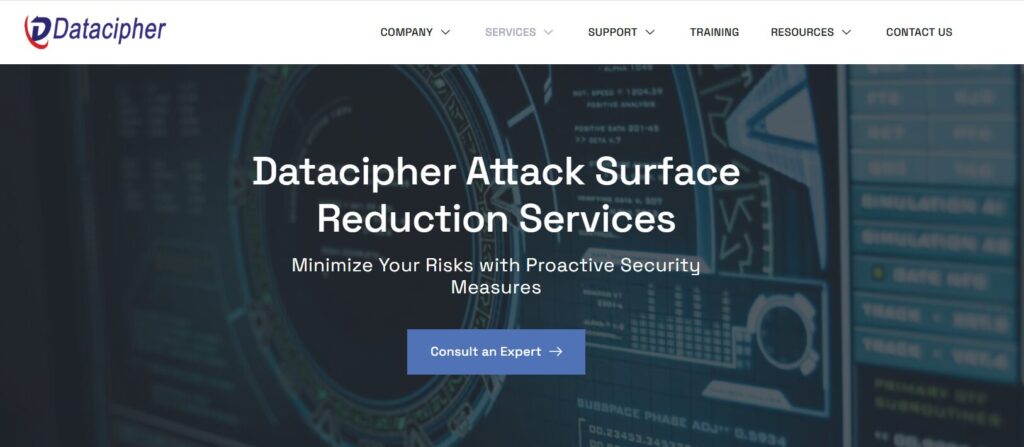
Source – Datacipher
Here is how we structure our VAPT services:
Breach Attack Simulations
We replicate real-world adversary techniques to assess how your environment handles targeted attacks. These simulations are built around your industry’s threat landscape and system architecture. The objective is to evaluate both detection and response under controlled, risk-free conditions.
Vulnerability Management
We offer scheduled or on-demand scans supported by analyst oversight. Each assessment goes beyond technical findings to identify exploitability and map risk to business processes. This allows internal teams to triage vulnerabilities based on likelihood and potential impact.
Penetration Testing (Black Box and White Box)
Our internal and external testing is conducted with clearly defined scopes and attack paths. Black Box tests simulate an external attacker with no prior access. While white Box tests examine the system from an insider perspective. Both aim to identify weaknesses that traditional scans may overlook.
Application Security (SAST, DAST, SCA)
We integrate security testing across development workflows. From static code review to runtime analysis and open-source dependency scanning, we provide full lifecycle coverage to help secure software before deployment.
Each engagement is followed by reporting that is designed to support decision-making. Our documentation is structured to assist both technical remediation and high-level risk communication. Whether you’re briefing your CISO or directing your DevOps team, our findings are actionable, prioritized, and tied to real business risk.
Our role does not end with sharing the report. We help you turn the findings into roadmap decisions, to reduce your real attack surface. Not just theoretical risks.
Proactive attack surface management is essential for this. To explore how modern enterprises are reducing exposures and improving visibility, check out our recommended guide: 10 Essential Use Cases for Attack Surface Management.

#2. TCS
TCS offers vulnerability assessment and management services as part of its broader cybersecurity portfolio. Their offering focuses on centralized visibility, regular scanning, and integration with existing enterprise systems. Most deployments are aligned with SOC operations and built to support internal compliance and governance efforts.
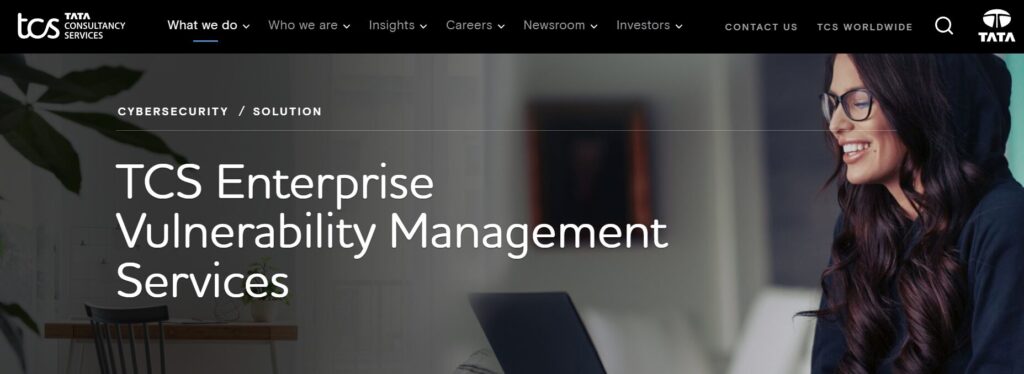
Source – TCS
The service includes asset discovery, internal and external scanning, and basic prioritization based on business risk. TCS also supports integration with IT Service Management(ITSM) platforms for remediation tracking.
TCS is typically engaged by clients with complex environments that require central oversight across business units, regions, and cloud providers.
#3. Infosys
Infosys offers vulnerability assessment and penetration testing services through its Cyber Scan platform and broader cybersecurity offerings. The platform enables continuous scanning across infrastructure and applications, combined with risk-based prioritization and remediation tracking through ITSM integrations.
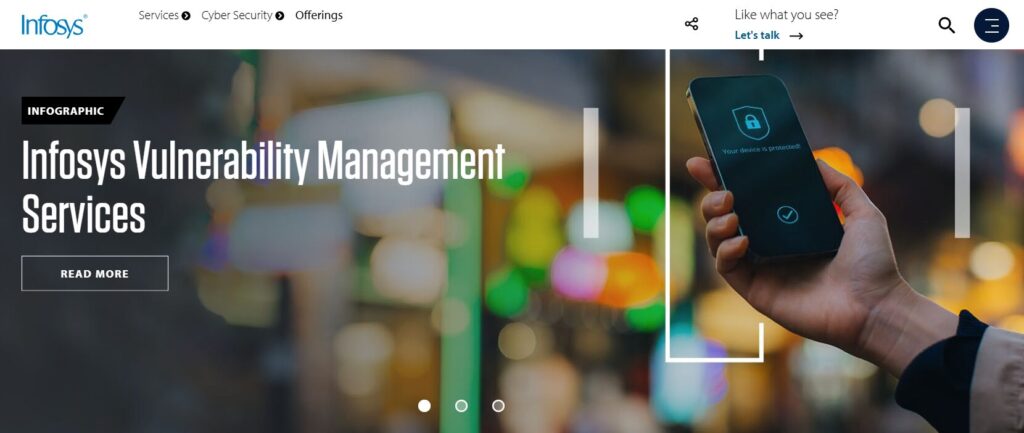
Source – Infosys
Their services cover internal and external scanning, including both automated and manual testing. This includes infrastructure vulnerability management, application security testing, and penetration testing supported by red teaming techniques. Infosys also offers offensive security assessments that evaluate real-world exploitability in enterprise systems.
The approach is generally suited for large organizations that require centralized control, regulatory alignment, and integration into existing service management workflows.
#4. HCLTech
HCLTech offers vulnerability assessment and penetration testing services through its cybersecurity consulting portfolio. Their approach includes assessments of system configurations, security architecture, and identification of vulnerabilities using both automated tools and manual techniques.
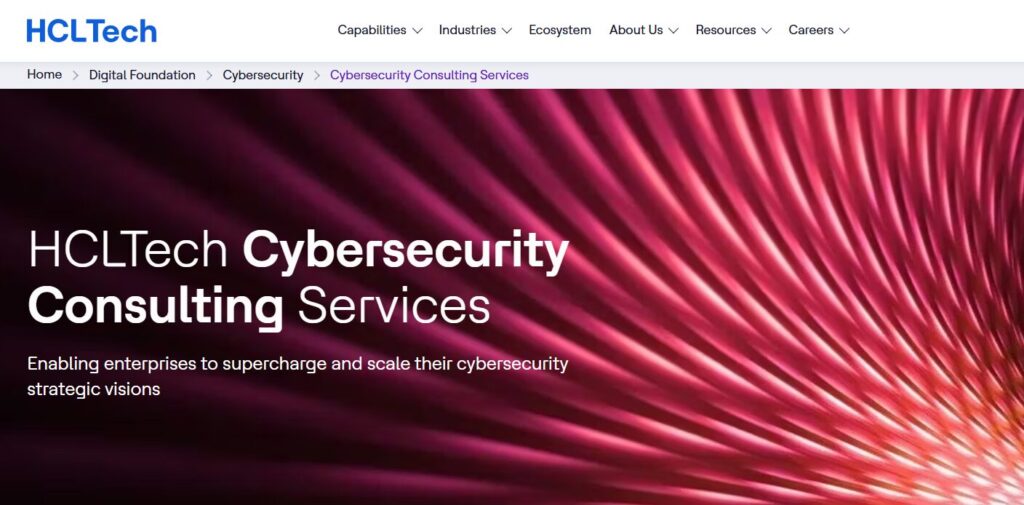
Source: HCLTech
These services are typically suited for organizations seeking comprehensive security evaluations integrated into broader cybersecurity strategies.
#5. Wipro
Wipro offers VAPT services through its Cyber Defense and Response portfolio, anchored by its global Cyber Defense Centers.
Their Threat and Vulnerability Management team is responsible for conducting vulnerability assessments and penetration testing. These services are followed by remediation recommendations and are delivered alongside other security operations such as threat intelligence, incident response, and managed detection.

Source – Wipro
The service is positioned for enterprises that want vulnerability identification integrated within a larger security operations framework. It is part of Wipro’s broader effort to combine detection, protection, and response within a unified cyber defense model.
#6. Tech Mahindra
Tech Mahindra offers VAPT services as part of its broader cybersecurity portfolio. Their security practice spans infrastructure, applications, and OT/IoT environments. Capabilities include risk-based vulnerability management, configuration assessments, and internal and external threat simulations.
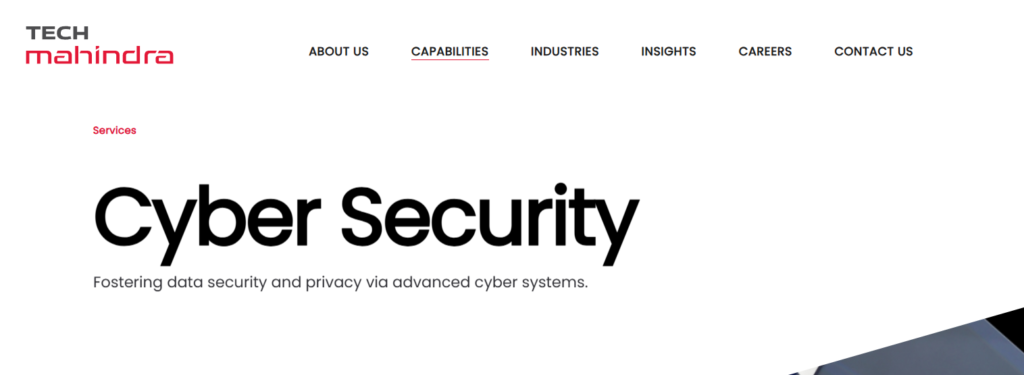
Source- Tech Mahindra
These offerings are designed to help enterprises strengthen cyber resilience. The approach combines proactive identification of security gaps with remediation strategies. VAPT services are delivered as part of a wider ecosystem of advisory, implementation, and managed defense solutions. Their services are particularly suited for enterprises operating in complex, regulated environments.
#7. Capgemini
Capgemini India offers a suite of cybersecurity services, including vulnerability assessment and penetration testing, as part of its broader cybersecurity portfolio. Their services encompass risk assessment, security testing, and application security evaluations. Capgemini’s approach combines automated tools with manual techniques to identify and remediate vulnerabilities across various platforms.

Source – Capgemini
Additionally, Capgemini provides Application Security Testing services, which involve both manual and automated testing of web-based, mobile, and business applications. Clients receive actionable results through a dedicated portal, facilitating the understanding of application security posture and aiding in the development of appropriate remediation strategies.
Capgemini’s VAPT offerings are best suited to enterprises looking for testing solutions embedded within broader risk and compliance programs.
#8. PwC India
PwC India offers Vulnerability Assessment and Penetration Testing services as part of its broader cybersecurity consulting practice. These services fall under their threat and vulnerability management offerings, which aim to help enterprises identify, prioritize, and mitigate security gaps across systems, applications, and infrastructure.
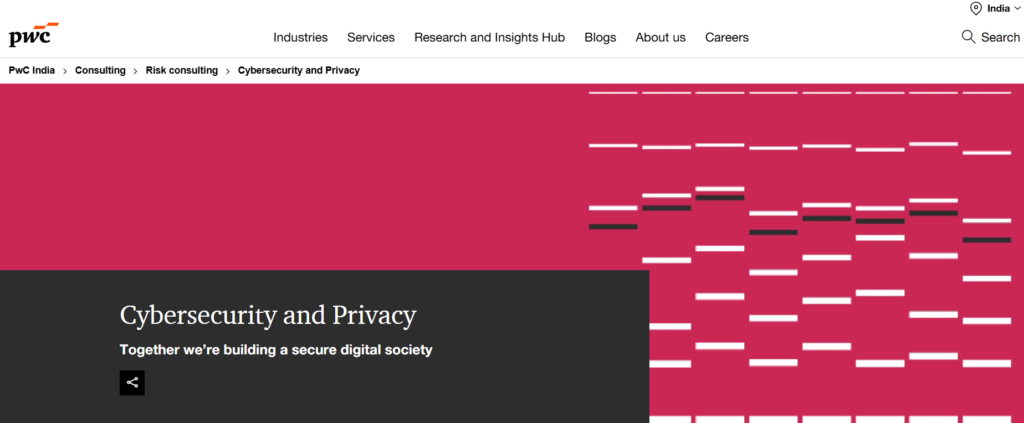
Source – PwC
Their approach includes assessments aligned with business risk and regulatory requirements, supported by remediation planning and incident readiness. VAPT is delivered within an enterprise-focused model that connects testing outcomes to risk management, compliance, and board-level reporting.
#9. Network Intelligence India
Network Intelligence India provides enterprise-grade VAPT services across infrastructure, cloud environments, and applications. Their portfolio includes internal and external network assessments, web and mobile application testing, red teaming, and structured remediation support.

Source – Network Intelligence India
They serve sectors like BFSI, telecom, manufacturing, and government. Their VAPT services are often tied to SOC operations and used to support compliance, audit readiness, or broader risk programs. They are a suitable partner for organizations with complex security and regulatory requirements.
#10. TAC Security
TAC Security offers Vulnerability Assessment and Penetration Testing (VAPT) services through its ESOF platform. The platform combines vulnerability discovery, risk assessment, and threat prioritization in one interface. Their services include web and mobile application testing, cloud infrastructure assessments, and network device evaluations.
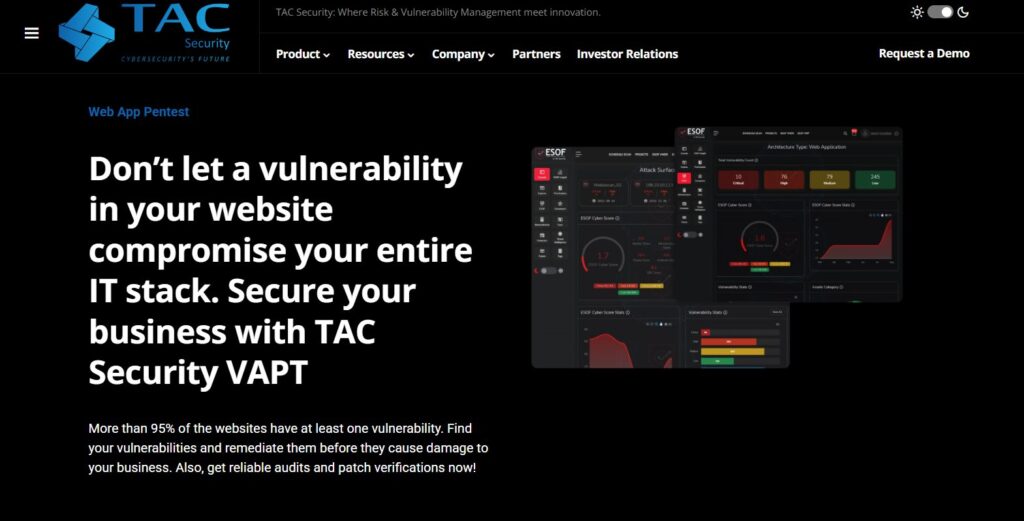
Source – TAC Security
The ESOF dashboard enables real-time monitoring and remediation tracking. TAC Security supports compliance with standards such as GDPR, ISO, and HIPAA. Their clients include organizations in BFSI, government, and large enterprise sectors.
How to Choose the Right VAPT Company in India: A Simple Litmus Test
We’ve now looked at some of the top VAPT companies in India. Each has its own approach, strengths, and focus areas. But across dozens of similar lists on the internet, one question still remains: How do you choose the right VAPT company for your enterprise?
Here’s one test worth using: If you handed the final report to your engineering lead and your compliance officer, would both know what to do next?
That’s where many providers fall short. Some deliver raw scan outputs filled with false positives. Others provide high-level summaries that don’t guide remediation. Neither helps when you need to fix critical issues, satisfy auditors, or brief leadership.
The best VAPT companies in India don’t just test; they translate. They explain exploit paths to engineers. They provide audit-ready summaries to compliance teams. And they help CISOs map technical findings to actual business risk.
If your VAPT vendor can’t do that, it’s not a partnership. It’s just a report. And that’s why you need Datacipher Solutions.
Why Datacipher is the Right VAPT Company in India for Your Enterprise?
Datacipher is not just another name on the list of VAPT companies in India. We are the team enterprises call when real risk needs real testing, and when the outcome cannot afford to be just another PDF.
We go beyond scanning and reporting. We also go beyond what most providers consider enough.
Here is what going the extra mile actually looks like:
- Simulated adversaries, not just scripts
Our breach attack simulations mirror how real attackers think. Every test is tailored to your systems, your stack, and your sector. - Fix-first approach
We stay on after the report. From patch validation to post-fix retesting, we work hand in hand with your teams to make sure issues are closed, not just documented. - Reports that drive action
Whether you are briefing a CISO or enabling a DevOps squad, our reports speak both languages. They are built for clarity and urgency.
- Full-stack coverage, no blind spots
From cloud workloads to APIs, from mobile apps to ransomware simulations; we test where the threats are, not just where it is easy.
For instance, in late 2024, a fintech enterprise preparing for a compliance audit reached out with concerns about lateral movement and unmonitored APIs. We ran live simulations in both staging and production. Within a few days, we helped them close priority gaps, and translated every finding into a format their auditors could trust and their engineers could act on.
And that’s what a real VAPT partnership looks like. Hands-on, high-impact and built for enterprise speed and complexity.
If you are looking for a VAPT partner that understands enterprise context, Datacipher is built for that. Let us help you harden your infrastructure. Book your VAPT engagement with Datacipher today.
Frequently Asked Questions
1. What exactly is covered under VAPT services in India?
VAPT typically includes vulnerability scanning, manual exploitation, misconfiguration checks, and post-test remediation guidance. For enterprise clients, it often spans web apps, APIs, infrastructure, and cloud. The depth depends on scope. Some firms offer red teaming and ransomware simulations, while others stop at automated scans.
2. How often should an enterprise run VAPT assessments?
At minimum, twice a year; but high-change environments should test quarterly. Anytime you push a major update, migrate infrastructure, or onboard a new third-party platform, VAPT should follow. Frequency should align with your risk exposure and compliance obligations, not just calendar dates.
3. What is the difference between a vulnerability scan and a full VAPT engagement?
A vulnerability scan is automated. A full VAPT combines tools with human logic. It tests how flaws can be chained, exploited, and moved laterally. Scans find symptoms. VAPT uncovers real risk. If you only get a list, you didn’t get a proper test.
4. Do Indian VAPT companies follow global standards like OWASP or ISO 27001?
The credible ones do. Most reputable VAPT providers in India align their testing with OWASP Top 10, SANS, NIST, and ISO frameworks. Some are also CERT-In empanelled. Standards ensure consistency, but depth still depends on how the test is executed, not just what logo they follow.


